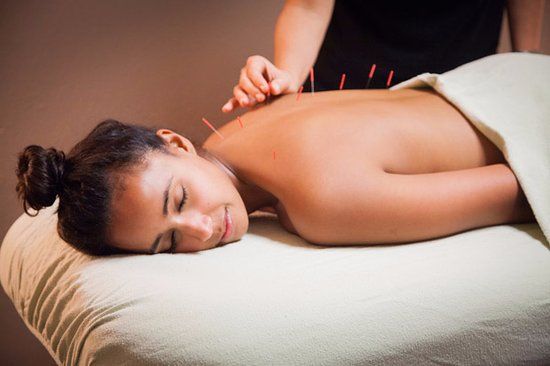
Synapse Physiotherapy
What Is Dry Needling?
Dry needling is a specialized therapy designed to relieve muscle pain and spasms by targeting trigger points using thin, sterile needles. Unlike acupuncture, which is rooted in traditional Chinese medicine, dry needling is based on modern anatomical and neurophysiological principles. Physiotherapists and healthcare professionals widely use this treatment to relieve tension, improve mobility, and accelerate healing.
If you’ve been struggling with persistent muscle spasms, stiffness, or pain, searching for “dry needling near me“ can help you find a local expert to provide relief.
How Does Dry Needling Work?
Dry needling involves inserting a fine needle into specific muscle trigger points, which initiates a localized twitch response. This reaction enhances blood circulation, releases chemical mediators, and stimulates the nervous system. The combined effects help reduce pain and improve muscle function by addressing the root causes of muscle tightness. This technique works through a mix of mechanical, neurological, and chemical processes, primarily focused on disrupting tight muscle bands and altering pain signaling.
Key Physiological Mechanisms of Dry Needling:
-
Trigger Point Activation: The main target of dry needling is a myofascial trigger point (MTrP), a sensitive knot within a tight muscle band that can cause localized or referred pain.
-
Twitch Response Effect: When the needle stimulates a trigger point, it often causes an involuntary muscle twitch, which is considered a sign that the treatment is effectively engaging the muscle.
-
Enhanced Blood Circulation: Needle insertion promotes vasodilation, increasing blood flow to the affected area. This helps deliver essential oxygen and nutrients, aiding in muscle recovery and tension relief.
-
Neurotransmitter Release: Dry needling encourages the release of pain-relieving chemicals like endorphins, which help reduce discomfort and improve overall pain perception.
-
Muscle Relaxation: By breaking up tight muscle bands, this technique facilitates muscle relaxation and enhances flexibility and movement.
-
Central Nervous System Effects: Dry needling’s sensory input influences the central nervous system, potentially leading to widespread pain relief beyond the treated area.
Benefits of Dry Needling for Muscle Spasms
1. Effective Pain Relief
By directly targeting muscle trigger points, dry needling helps reduce pain and discomfort in common problem areas such as the neck, back, shoulders, and hips. It works by deactivating tight muscle knots, offering long-lasting relief.
2. Increased Flexibility & Mobility
Releasing tension within muscles enhances movement and flexibility. This makes dry needling particularly beneficial for athletes, individuals recovering from injuries, and those dealing with mobility restrictions.
3. Boosted Blood Circulation
The insertion of fine needles stimulates increased blood flow to the affected muscles, which accelerates healing, minimizes inflammation, and supports overall tissue repair.
4. Deep Muscle Relaxation
Dry needling helps relieve muscle stiffness and tightness, preventing spasms and promoting a deep sense of relaxation throughout the body.
5. Faster Recovery Time
By addressing the root cause of muscle pain and dysfunction, dry needling speeds up the recovery process for injuries, overuse conditions, and post-exercise soreness—helping individuals return to their regular activities more quickly.
6. Enhanced Nerve Function
Research suggests that dry needling can improve nerve signaling, leading to better muscle control, reduced nerve-related pain, and overall improved neuromuscular function.
- Minimally Invasive & Drug-Free
Dry needling does not involve medication or surgery, making it a natural and safe alternative to pain relief methods that rely on drugs.
What to Expect During a Dry Needling Session
If you’re considering dry needling, here’s what a typical session looks like:
- Initial Assessment – Your physiotherapist or healthcare provider will evaluate your symptoms, pain points, and medical history to determine if dry needling is right for you.
- Needle Insertion – Thin, sterile needles are inserted into trigger points. You may feel a slight prick or twitch, which indicates the muscle is responding.
- Muscle Response – As the needle stimulates the trigger point, you might experience muscle twitches or a mild aching sensation. This is a normal reaction.
- Post-Treatment Care – After the session, you may feel some soreness for 24–48 hours, similar to the sensation after an intense workout. Gentle stretching, hydration, and heat therapy can help relieve any discomfort.
Is Dry Needling Safe?
Yes, dry needling is a safe procedure when performed by a trained professional. The needles used are sterile and single-use, minimizing any risk of infection. Most patients tolerate the treatment well, with only minor side effects such as temporary soreness or mild bruising.
However, dry needling may not be suitable for individuals with certain medical conditions, such as blood clotting disorders or severe needle phobia. It’s always best to consult with a licensed provider before starting treatment.
How to Find the Best Dry Needling Provider Near You
When searching for “dry needling near me,” consider the following factors to find the best provider:
- Check Credentials – Ensure the practitioner is a licensed physiotherapist or healthcare provider with certified dry needling training.
- Read Reviews – Look at patient reviews and testimonials to gauge the provider’s reputation and effectiveness.
- Ask About Experience – Find out how many years of experience they have in treating conditions similar to yours.
Compare Pricing – Dry needling costs can vary, so inquire about session fees and any available packages.
FAQs About Dry Needling
1. Does dry needling hurt?
Most patients feel minimal discomfort. Some may experience a twitch response or mild soreness afterward, but it typically subsides within 24-48 hours.
2. How many sessions do I need?
The number of sessions depends on the severity of your condition. Some people feel relief after one session, while others may need multiple treatments for lasting results.
3. Is dry needling the same as acupuncture?
No. While both use thin needles, acupuncture is based on traditional Chinese medicine, focusing on energy flow, whereas dry needling targets muscle knots and trigger points based on modern medical science.
4. Can I do dry needling at home?
No. Dry needling should only be performed by a trained professional to ensure safety and effectiveness.
5. Who should avoid dry needling?
People with bleeding disorders, pregnancy, or a severe fear of needles should consult a doctor before considering dry needling.
Conclusion: Experience the Benefits of Dry Needling at Synapse Physiotherapy
If you’re struggling with muscle spasms, stiffness, or chronic pain, dry needling can be a highly effective solution to restore movement and relieve discomfort. By targeting trigger points, improving blood flow, and promoting muscle relaxation, this therapy accelerates healing and enhances overall physical function.
At Synapse Physiotherapy, our expert team specializes in dry needling and other advanced physiotherapy treatments to help you recover faster and feel your best. Don’t let muscle pain hold you back—book your session today and experience the relief you deserve!
Tags :

Back & Neck Pain
Conditions such as stiffness, postural abnormalities and muscle overuse from prolonged desk work at the office or home is more prevalent than most would think. We provide the necessary tools to fix you up and educate you on ergonomics which can unload unnecessary stress.
- Spine & Core Rehabilitation
- Strength & Conditioning Programme
- Pain Management
- Biomechanical Assessment
- Sports Physiotherapy
- Group Class
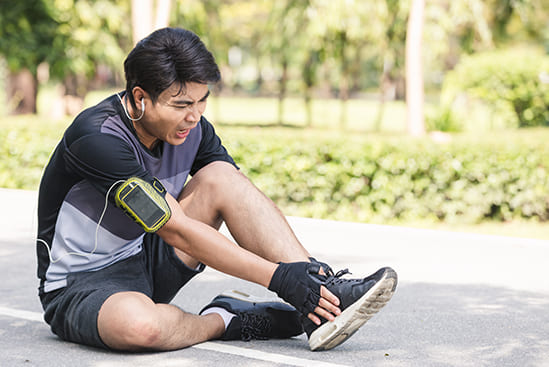
Sports Injuries
Rolled ankles, jarred knees, impinged shoulders are few conditions in the plethora of sports injuries which can hamper performance and limit our enjoyment of sports. Physiotherapy not only treats the symptoms of these conditions but propels your overall fitness to greater heights.
- Strength & Conditioning Programme
- Pain Management
- Biomechanical Assessment
- Sports Physiotherapy
- Shockwave Therapy
- Group Class

Work Desk Injuries
Conditions such as stiffness, postural abnormalities and muscle overuse from prolonged desk work at the office or home is more prevalent than most would think. We provide the necessary tools to fix you up and educate you on ergonomics which can unload unnecessary stress.
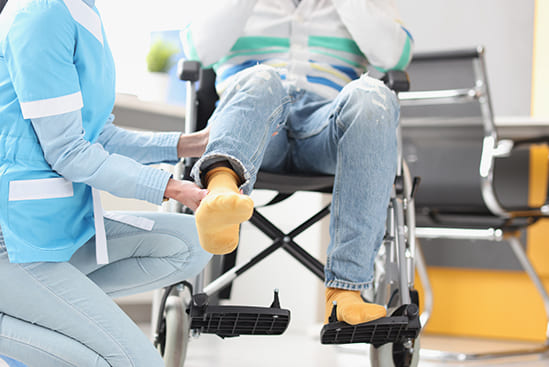
Pre-Post-Surgical Conditions
Surgery involves going through preparation both before and after. Physiotherapists play a vital role in getting your body ready for surgeries with circulatory, breathing and strengthening exercises. After the procedure, let us be there for your recovery and rehabilitation, taking it one step at a time.

Scoliosis & Postural Abnormalities
The way we stand, sit, walk and sleep has influence over our posture and the overall balance of muscles controlling its alignment. A comprehensive screening can be done by our physiotherapists to detect abnormalities, which we will aid in correcting.
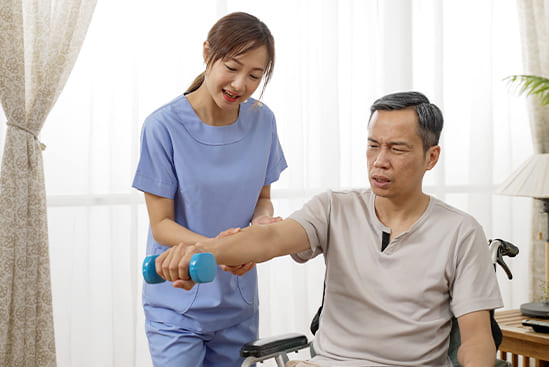
Neurological Conditions
Neurological disabilities such as stroke, nerve compression and neuropathies can be barriers for patients to live life to its fullest. We at Synapse are committed to help you overcome these hurdles by ensuring functional mobility and quality of life is at its optimum by providing the right treatment and exercises.
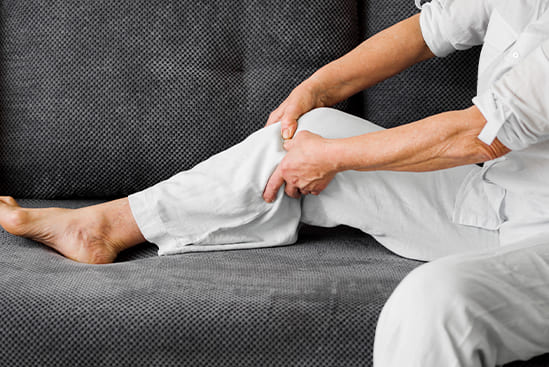
Osteoarthritis & Rheumatism
Joint degeneration and inflammation happens as the human body grows older, but that does not mean our way of life degenerates as well. Relief your joint pains with a joint effort together with your physiotherapist, who will provide pain-relief treatments and prescribe exercises for your wellbeing.
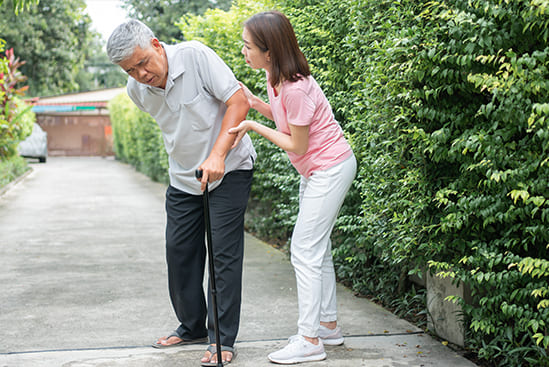
Conditions Relating To Elderly
Common conditions in the older age population include hips & knee pain, back & neck pain, osteoarthritis, rheumatism, fear of falling and many more. Aging and degeneration of bodily function is inevitable, but here at Synapse, we will help you live the best of your life.

Home Physiotherapy
We understand that some conditions or injuries can make it difficult to receive rehabilitation at our clinic be it mobility or transportation issues. Our objective is to provide you with the same high-quality physiotherapy services at home that you would receive in-clinic.
